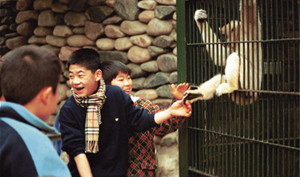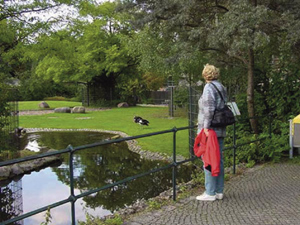On January 26, a polar bear in Everland Zoo broke the hearts of watchers as it clawed at the bars blocking it from going back to its sleeping quarters. The bear kept banging its head against the bars, by then scratched raw of its white paint. On-lookers who could not take it anymore shouted at the zookeepers to let the bear in, but the zookeepers did nothing about it until closing time.
Eagles that never spread their wings… Animals bored to death
"If you had any love for animals, the zoo would be a really sad place." Says 'Ha Ho,' an animal welfare group within the Green Korea United that recently released a zoo observation report after taking a look at zoos from the viewpoint of animal welfare rather than animal exhibition.
Predatory birds like eagles rarely use their wings in their narrow cages, herbivores such as deer and zebras stand on concrete floors devoid of grass, gorillas sit in a cage with only wall paintings of forests, and polar bears languish in a cage with whitewashed walls instead of icebergs. Animals meant to run free in the wilderness but kept in spaces hardly big enough for pacing grow bored in captivity.
That is the state of the zoo in Seoul Grand Park. If a metropolitan zoo that boasts the widest grounds and largest crowd is in such a sorry state, one needs no clues about the state of other local zoos. Most zoos are failing to even keep their heads above water, much less care about animal welfare.
In the case of Everland Zoo, where admission fees are quite high, the cages are relatively well kept and the animals in good condition. However, the animals face a high level of stress from being exposed all day to humans without any windows separating the watchers from the watched.
Safari World, the first of its kind in Korea, consists of car rides allowing visitors to get as close as possible to huge beasts such as lions, tigers and bears. Safari World is so popular that on holidays, visitors have to stand in line for 25~30 minutes. But anyone who pictures a real safari where beasts roam free in their natural habitat is sadly mistaken. Lee, a housewife living in Seoul, says, "The animals are trained to do simple tricks when thrown a biscuit their way. So it's hard to observe natural animal behavior."
Lighting a cigarette, throwing coins… Serious animal abuse

Go to the monkey cage in any zoo and you will find the place littered with rubbish such as tidbits, peanut shells, orange peel, plastic bags, sweets and so on. People take it for granted that they can feed the monkeys, despite warning signs prohibiting such behavior. Then there are kids who frighten jindo dogs (a pedigree indigenous to Korea) by screaming at them, or throw stones or spit into the ponds where birds like mandarin ducks and swans live. Such misconduct usually goes unchecked.
"There are men who light cigarettes to give to monkeys, and children who use sticks to poke at animals that don't move. People throw coins at crocodiles and hippos, and carry around balloons that can be fatal to animals. We try to stop them but it's no use." (zookeeper at Seoul Grand Park Zoo)
This kind of 'zoo-visiting' is close to animal abuse. Members of 'Ha Ho' say they wonder if "animals really have any effect on children's emotional growth."
Professor Philippe Thibaut (Konkuk Univ.) of 'Animal Freedom Korea' says, "The overall opinion among English psychologists these days is that if a youngster shows violence against other people, it often springs from his attitude towards animals and nature." 터보 once pointed out that "teenagers who abuse animals and children who are cruel to birds and trees have chosen to harm others."
The most popular among visitors to the zoo is none other than animal shows. Asked what they found most memorable at the zoo, children usually answer, "The chimpanzee show" or "The seal show." To attract as many visitors as possible, zoos usually train animals for entertainment.
Environmentalists however, claim that such shows must end. The Love for Life Action Committee and the Forum Against Abuse of Life Forms, which issued a statement last year in opposition of an animal performance theater in Seoul Grand Park Zoo, criticized animal shows for "instilling misconceptions about the existence of life forms instead of teaching people to understand nature and ecological values for the coexistence of humans and nature."
"Environmental lessons in other countries teach children ecological values by getting them to imitate the feelings of other life forms. Training animals to put on shows forces meaningless behavior on animals and meaningless entertainment on humans, thereby going against the call of the times, which is to learn how to sympathize with other forms of life."
Indigenous animals such as tigers and leopards to be protected first as Korean specialties

Plans that have been confirmed so far include an ecology zoo of indigenous animals. Endangered species indigenous to Korea such as the tiger, leopard, fox, wildcat, otter, oriental white stork, moon bear, and yellow throated marten will be protected as Korean specialties, so that the zoo can gain world competitiveness.
Eo Gyeong Yeon, a veterinarian at Seoul Grand Park, says, "Any zoo creates ecological problems such as disruption of the food chain, by the simple fact that zoos cage in wild animals. However, we are researching ways to provide as much space and as ideal an environment as possible for the animals while at the same time contributing to the preservation of their species."
The biggest task ahead for the Seoul Grand Park's ecology zoo project is securing funds. Whatever lies ahead, one thing is clear - animals should no longer be displayed like goods in a department store for visitors to ogle at. In rearing animals, zoos must place more value on the preservation and restoration of the ecosystem, while at the same time making an effort to educate humans as well. Above all, an ecology zoo that respects the rights of animals will be possible when people first adopt a better attitude as zoo visitors.

